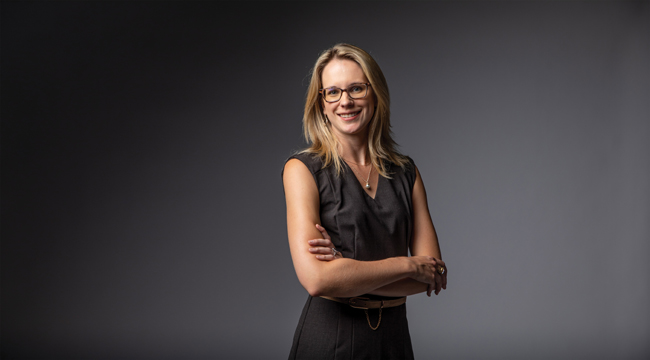
Among the first things you might notice about Jennifer Larson’s office are enormous, striking photos of crowds taken in different settings—including a group of tourists gathered around a geyser in Iceland and a sea of umbrellas at an outdoor amphitheater on a rainy day in Italy. “Pictures of lots of people doing things together seemed appropriate,” she said.
That’s because Larson, an associate professor of political science, studies social networks and how a person’s relationships with their family, neighbors and friends influence their political behavior. “What about their relationships makes them likely to vote or not vote, or join a political protest or participate in an armed uprising?”
Larson, who holds a bachelor’s degree from Creighton University and a Ph.D. from Harvard, has studied this in a number of different contexts in the United States and abroad, looking at the past and the present. For example, she’s examined how mining towns out West that essentially sprang up with no government infrastructure managed to keep the peace in the absence of law enforcement. As it turned out, it wasn’t all that different from your average high school, where the threat of being ostracized seemed to be enough to keep most people in line.
“In a small community where everybody knows everybody else’s business, if you go to the saloon and someone says, ‘Did you know that guy stole from someone else?’ that’s going to spread like wildfire. And everyone who hears that is going to be angry and might form a posse to punish the wrongdoer,” she said. “So gossip can be an effective way to enforce social norms.”
The grapevine not only plays an important role in sharing information, Larson said, but also in vetting it. In other research, she has mapped the relationships of entire communities and tracked how a piece of information shared with just a few members—an invitation to a community gathering—could eventually become common knowledge, and be determined to be reliable, even if the information is unusual or unexpected. “It showed us how people use their social networks to do something new, and maybe risky,” she said.
Some of her other work is more methodological in nature, seeking to refine how data is collected and processed to study these kinds of questions. “We’re at a place where we understand that personal relationships and social networks matter quite a lot, but we really need to sort out the best practices for research that give us good answers for exactly how they matter,” she said.